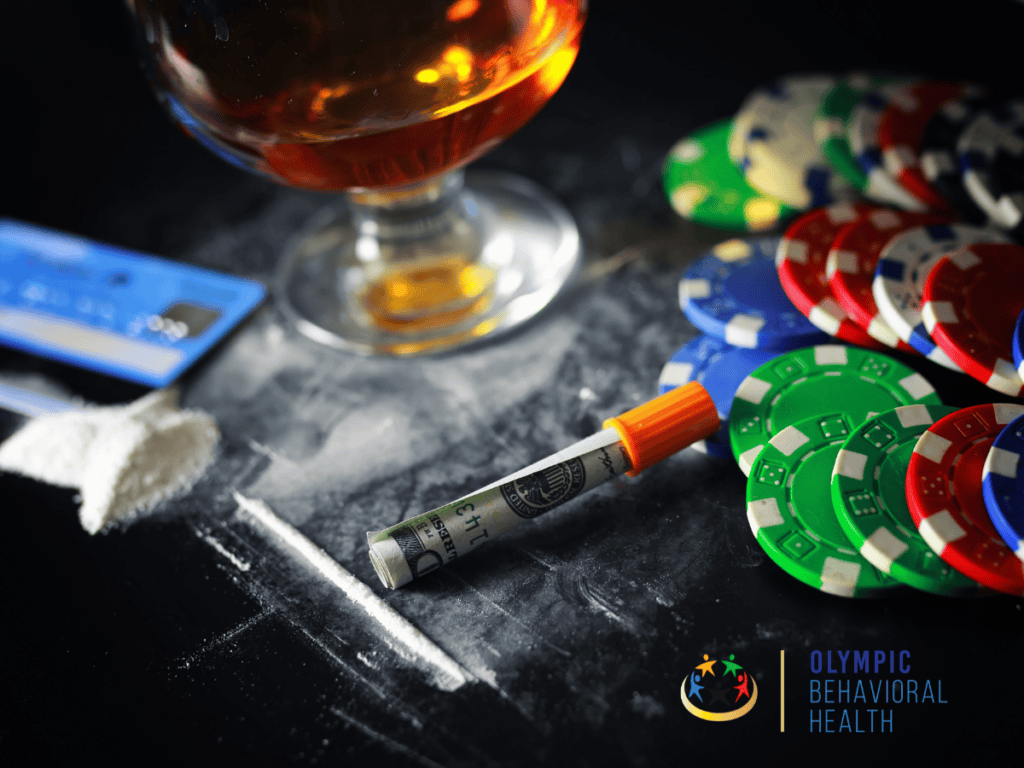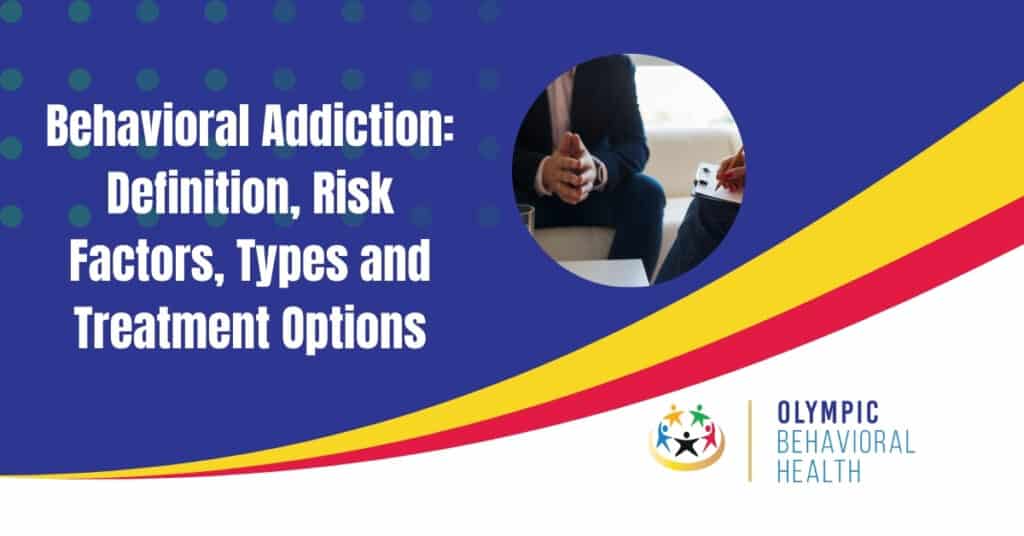Behavioral addiction refers to patterns of behavior that become excessive, leading to negative consequences in various areas of life. Symptoms of behavioral addiction can include an inability to control the behavior, preoccupation with engaging in the behavior, and continued engagement despite adverse effects.
A wide range of behaviors can become addictive, including gambling, internet use, gaming, shopping, and even exercise. Each type may require tailored interventions based on the underlying factors driving the addictive behavior.
Treatment options for behavioral addiction encompass various approaches, such as Cognitive behavioral therapy (CBT), psychotherapy, medication, support groups, and lifestyle changes. While there is no one-size-fits-all solution, a combination of therapies often yields the best results in managing addiction and preventing relapse.
What is a Behavioral Addiction?
Behavioral Addiction is characterized by the failure to resist an impulse, drive, or temptation to perform an act that is harmful to the person or others. It involves a recurrent pattern of behavior that interferes with functioning in other domains. Behavioral addictions share similarities with substance use disorders in terms of natural history, phenomenology, and adverse consequences. These addictions may include behaviors such as pathological gambling, kleptomania, compulsive sexual behavior, compulsive buying, internet addiction, and excessive tanning.
Behavioral addiction can result in functional impairments in various domains of life and shares similarities with substance addiction. Treatment typically involves psychotherapy and psychopharmacotherapy, with preventive measures focusing on education, awareness programs, and monitoring potentially addictive behaviors.
How Is a Behavioral Addiction Different from A Substance Addiction?
Behavioral addiction differs from substance addiction in that it involves compulsive engagement in rewarding behaviors or activities, rather than the use of substances like drugs or alcohol.
A behavioral addiction involves a compulsive pattern of behavior that is difficult to control despite the negative consequences. Examples of behavioral addictions include video game addiction, internet addiction, sexual addiction, and pathological gambling. Behavioral addictions do not involve physical signs, such as intoxication. The high in behavioral addiction comes from the behavior or feeling experienced by the person.
Substance addiction, on the other hand, refers to a condition where a person becomes physically and psychologically dependent on substances such as drugs, alcohol, and nicotine, despite the negative consequences. Substance addiction often involves withdrawal symptoms, which may be mild or severe, depending on the substance used and the duration of use. Examples of substance use disorders include opioid addiction, alcohol addiction, and nicotine addiction.

What Are the Risk Factors for Developing Behavioral Addiction?
Risk factors for behavioral addiction include genetic predisposition, co-occurring mental health disorders such as depression or anxiety, past trauma or neglect, and specific environmental influences. These factors contribute to the development of compulsive behaviors that provide temporary relief or pleasure, leading to a cycle of addiction.
Genetic predisposition: Genetic predisposition plays a significant role in the development of behavioral addiction. As per Popescu, A., Marian, M., Drăgoi, A. M., & Costea, V. (2021). Understanding the genetics and neurobiological pathways behind addiction (Review) heritability plays a role in determining how likely someone is to develop an addiction, influencing 40-60% of the population’s variability in this aspect.
Genetic factors can influence a person’s vulnerability to addiction, with variations in genes affecting responses to addictive substances or behaviors. These genetic differences can manifest in various ways, such as heightened preferences for certain addictive behaviors or more severe withdrawal symptoms. Familial patterns of addiction also suggest an inherited component. Understanding the genetic basis of addiction can help develop more targeted and personalized treatment approaches.
Engaging in addictive behavior initially: Engaging in addictive behaviors initially increases the risk of developing behavioral addictions, which include gambling, overeating, and internet addiction. Individuals experiencing difficulty controlling these behaviors may encounter withdrawal symptoms when attempting to stop. The compulsion to engage in rewarding behaviors characterizes addiction, whether it involves substances or behaviors. Additionally, the age of first drug consumption significantly influences the likelihood of developing substance abuse disorders, underscoring the importance of early intervention.
Family history of addiction: Family history of addiction significantly influences the risk of developing behavioral addiction. Individuals with behavioral addictions, like gambling, overeating, and internet addiction, often share similarities with substance addiction, making them susceptible to familial predispositions. The home environment during childhood plays a crucial role, with exposure to drug use within the family increasing the likelihood of developing a substance use disorder later in life.
According to Grant, J. E., & Chamberlain, S. R. (2020), in their article “Family History of substance use disorders: Significance for Mental Health in young adults who gamble” published in the Journal of Behavioral Addictions, individuals with a Family history of SUD exhibited higher rates of substance use (alcohol, nicotine), elevated rates of problem gambling, and increased occurrence of mental health disorders compared to those without such a family history. Additionally, individuals with a family history of SUD displayed more set-shifting problems, higher rates of obsessive-compulsive tendencies, poorer quality of decision-making, and increased spatial working memory errors.
These results suggest that individuals who gamble and have a first-degree family member with a SUD may present with distinct clinical and cognitive characteristics.
Poor Impulse Control: Individuals with poor impulse control often engage in impulsive behaviors without considering the potential outcomes, leading to excessive engagement in addictive behaviors. Factors like genetic predisposition, environmental influences, emotional regulation difficulties, and underlying mental health disorders can influence poor impulse control.
What Role Do Technology and The Internet Play in Developing a Behavioral Addiction?
Technology and the internet play pivotal roles in fostering behavioral addiction, encompassing various online activities like social media, gaming, gambling, and online pornography. Excessive and compulsive use of these technologies can negatively affect multiple life domains, impacting psychological, physical, social, and developmental well-being.
Due to ongoing brain development, children and adolescents are especially vulnerable to the influences of social media and gaming, which can impact their growth and mental health experiences. It is crucial to identify symptoms like loss of control, neglect of responsibilities, and persistent use despite negative outcomes.
Understanding that internet addiction can arise from a mix of psychological, social, and environmental factors is important. Treatment typically includes cognitive-behavioral therapy (CBT), medication, inpatient programs, and support groups. Schools also play a vital role in educating about responsible internet use and establishing policies to reduce addiction risks.
What Impact Has Behavioral Addiction Had?
Behavioral addiction, such as addiction to gambling, gaming, or social media, can have significant impacts on both mental and physical health. These addictive behaviors often consume excessive time and energy, impairing overall well-being and quality of life.
Here is how behavioral addiction can impact your mental health and body:
Mental Health
Behavioral addictions can significantly impact mental health, leading to various emotional and psychological challenges. Individuals struggling with behavioral addictions may experience:
- Emotional Distress: Feeling of guilt, shame, anxiety, or depression
- Impulse Control Issues: Difficulty resisting urges or temptations related to addictive behaviors
- Relationship Strain: Strained personal and professional relationships due to the all-consuming nature of addictive behaviors
- Mood Disorders: Development of mood disorders such as depression and anxiety
- Withdrawal and Isolation: Experiencing withdrawal symptoms, obsessive thoughts, and isolationism
These effects highlight the complex interplay between behavioral addictions and mental health, emphasizing the importance of early intervention and appropriate treatment to address these challenges effectively.
Body
Behavioral addictions can impact the body in various ways, leading to physical health problems and lifestyle changes. Certain behavioral addictions, like compulsive overeating or excessive gambling, can contribute to issues such as heart disease, obesity, sleep disturbances, weight fluctuations, malnutrition, and a sedentary lifestyle, affecting overall health and well-being.
Behavioral addictions can impact the body in various ways, including:
- Sleep problems: Difficulty sleeping or excessive sleepiness due to disrupted sleep patterns.
- Musculoskeletal issues: Pain in the neck, back, and wrists from repetitive behaviors or poor posture.
- Eye strain: From excessive screen time.
- Weakened immune system: Due to stress and neglecting healthy habits.
- Increased risk of obesity: From neglecting physical activity and potentially unhealthy food choices while indulging in addictive behavior.
What Are the Signs and Symptoms of A Behavioral Addiction?
Signs and symptoms of a behavioral addiction include preoccupation with the behavior, loss of control over its frequency or duration, withdrawal symptoms when attempting to abstain, and continued engagement despite negative consequences.
Here are some common signs and symptoms of behavioral addiction:
Signs
Understanding the common signs of a behavioral addiction is crucial, as these behaviors often mirror substance use disorders. Here are some key indicators to look out for:
- Inability to resist impulses or temptations related to harmful behavior.
- Recurrent patterns of behavior interfering with daily functioning.
- Urges or cravings before engaging in the behavior.
- Decrease in the pleasurable aspect of the behavior over time.
- Comorbid psychiatric disorders such as depression and anxiety.
- Cognitive features like rapid reward discounting and impaired decision-making.
Symptoms
Recognizing the symptoms of a behavioral addiction is crucial for understanding its impact. Here are some common signs to watch out for:
- Efforts to conceal the behavior.
- Inability to resist urges.
- Using the behavior to cope with stress.
- Defensive reactions when questioned.
- Excessive guilt after engagement.
- Failed attempts to cut back or stop.
- Mood swings when unable to engage.

What Are the Different Types of Behavioral Addiction?
Gambling Addiction
Gambling addiction, classified as a behavioral addiction, shares similarities with substance use disorder, altering brain chemistry and exhibiting withdrawal symptoms. Its prevalence varies globally, with significant impacts on individuals’ lives, often leading to financial, social, and psychological distress.
Gambling addiction is characterized by preoccupation, escalating bets, and using gambling to cope with negative emotions. Its causes involve brain chemistry, genetics, and mental health conditions. Treatment primarily uses psychotherapy, with CBT being a common approach. Preventive measures include limiting gambling and seeking help early. Research explores potential medications for managing gambling disorder.
According to a paper published in the Journal of Gambling Studies by Welte, John W., Barnes, Grace M., Tidwell, Marie-Cecile O., and Hoffman, Joseph H. in 2011, titled “Gambling and Problem Gambling Across the Lifespan,” the prevalence of problem gambling peaks at age 31–40. However, the age range from youth to late middle age does not show significant differences in problem gambling prevalence. Additionally, the age profile of problem gambling differs from that of alcohol dependence, with problem gambling becoming more prevalent than alcohol dependence after age 21.
Internet Addiction
Internet addiction, often referred to as problematic Internet use or Internet Addiction Disorder (IAD), is characterized by excessive or poorly controlled preoccupations, urges, or behaviors related to Internet usage. Individuals with internet addiction may exhibit symptoms such as compulsive internet use, withdrawal when unable to access the internet, tolerance requiring increasing amounts of time online to achieve the same satisfaction, and adverse consequences impacting various aspects of life including physical health, mental well-being, and social relationships.
The addictive nature of internet use can lead to individuals spending most of their waking hours online, neglecting other activities they once enjoyed, experiencing mood disturbances when unable to go online, and lying or concealing their internet use from others.
Similar to substance addictions, internet addiction can result in dependence, where individuals feel the need to spend more and more time online to achieve the same ‘high’. Furthermore, internet addiction shares similarities with other behavioral addictions such as gambling, overeating, and television compulsion, wherein individuals become addicted to the behavior or the feeling brought about by engaging in the behavior.
Sex Addiction
Sex addiction, also known as hypersexuality or compulsive sexual behavior, involves an uncontrollable focus on sexual fantasies, urges, or activities that cause distress and harm to various aspects of one’s life, including relationships, career, and health. This condition encompasses a range of behaviors such as compulsive masturbation, pornography consumption, multiple partners, and more, where the individual’s sexual thoughts and activities dominate their life. Treatment options for sex addiction include medications, psychotherapy, and self-help support groups.
Complications of sex addiction include difficulties in maintaining healthy relationships, decreased work performance, financial problems, health consequences such as sexually transmitted infections, and alterations in brain function leading to addictive behaviors. Despite the lack of a cure, effective management of sex addiction is possible with a lifelong commitment to treatment, akin to other types of addictions.
Shopping Addiction
Shopping addiction is characterized by compulsive buying behavior driven by a need to alleviate negative emotions like anxiety or depression. This disorder, also known as compulsive buying disorder (CBD), involves excessive shopping thoughts and actions, leading to distress and impairment in various life domains.
According to Rachubińska, Kamila, et al.’s 2022 study ‘Loneliness and the Degree of Addiction to Shopping and Work among Polish Women: The Mediating Role of Depression’ published in the Journal of Clinical Medicine, depression acts as a mediator between the feeling of loneliness and the degree of addiction to shopping and work among Polish women. The study found that an increase in the level of depression increases the degree of addiction to shopping and work, while the mediator’s participation lowers the feeling of loneliness. Loneliness itself was not a significant predictor of addiction to shopping and work in the examined population.
Also, in another study done by Etxaburu, Nerea, et al.’s 2023 study ‘Buying-shopping disorder, impulsivity, emotional dependence and attachment in adolescents’ published in Current Psychology, impulsivity is one of the factors involved in the etiology of buying-shopping disorder (BSD) and is related to emotional dependence.
Food Addiction
Food behavioral addiction, also known as food addiction, is characterized by compulsive overeating, loss of control over eating behavior, and spending excessive time focused on food. Common symptoms include gorging on more food than one can physically tolerate, eating to the point of feeling ill, going out of one’s way to obtain certain foods, and continuing to eat certain foods even when no longer hungry.
Treatment options typically include cognitive-behavioral therapy (CBT), support groups, commercial treatment programs, and psychiatric intervention with medications. These treatments aim to help individuals regain control over their eating habits, address underlying psychological factors contributing to addictive behaviors, and develop healthier relationships with food.
Video Games Addiction
Gaming Behavioral addiction, often referred to as video game addiction or internet gaming disorder, is characterized by significantly reduced control over gaming habits, leading to negative consequences in various aspects of life including personal, social, educational, and occupational responsibilities.
A study by Gros, L., Debue, N., & Lete, J. (2019). Video Game Addiction and Emotional States: Possible Confusion Between Pleasure and Happiness? indicate a possible confusion between pleasure and happiness among addicted users when associating their emotional states with video gaming. The prevalence of problematic gaming is estimated to range from 1.7% to over 10% among the general population.
Porn Addiction
Porn addiction involves an emotional dependence on pornography, impacting relationships and daily life. Signs include dissatisfaction with sex life, excessive spending on porn, and using it to cope with emotional issues. The classification of pornography addiction is debated, with some attributing it to broader issues. Cultural norms and personal beliefs about sexuality influence views on this addiction.
According to Qadri, Haseeb Mehmood et al.’s 2023 review article “Physiological, Psychosocial and Substance Abuse Effects of Pornography Addiction,” pornography addiction can have physiological, psychosocial, and substance abuse effects. Online porn consumption has increased due to technological advancements, serving purposes of leisure, education, and gratification.
Physiological effects include premature ejaculation, erectile dysfunction, and decreased libido linked to chronic masturbation and increased anxiety levels. Psychosocial effects encompass low mood, depression, decreased self-esteem, and challenges in emotional bonding with family members. Reasons for watching porn include boredom, seeking pleasure, and mood management, leading to social awkwardness and reduced family interaction.
Substance abuse effects of porn addiction resemble drug addiction, as porn stimulates the brain’s reward system similarly to drugs. Studies show a connection between porn addiction and drug abuse, with some individuals displaying hypersexual behavior, anxiety issues, and mood disorders.
The causes of porn addiction are complex, possibly linked to self-perception of addiction and various factors like trauma and mental health conditions. Treatment may involve therapy, support groups, and behavioral interventions to address underlying issues. Seeking professional help and a comprehensive approach to treatment are crucial for overcoming porn addiction.
How Does Addiction Affect the Brain’s Reward System?
Behavior addiction affects the brain’s reward system by triggering an overactivation of the pleasure circuits, leading to chronic changes in brain function, particularly in dopamine release and sensitivity. This alteration reinforces addictive behaviors and diminishes the brain’s response to natural rewards, leading to tolerance and compulsive behavior. Over time, addiction can impair various cognitive functions and contribute to a reward deficiency state, perpetuating the cycle of addictive behavior.
The brain’s reward circuitry, particularly the basal ganglia, plays a crucial role in addiction, as addictive substances overactivate this circuit, producing euphoria and reinforcing drug-seeking behavior. Dopamine, a neurotransmitter central to the reward system, is involved in signaling the importance of pleasurable experiences and reinforcing behaviors. However, addictive drugs disrupt normal dopamine signaling, leading to long-term changes in brain function and behavior.
Moreover, addiction involves dysregulation of both proponent and opponent brain reward processes, which can result in a reward deficiency state characterized by decreased hedonic tone. During withdrawal, brain reward is inhibited, contributing to the unpleasant symptoms experienced by individuals attempting to quit addictive substances.
How Do You Deal with A Behavioral Addiction?
Dealing with a behavioral addiction personally involves seeking professional help and support from therapies such as cognitive behavioral therapy, talk therapy, and group therapy. To manage and overcome behavioral addictions, it’s essential to follow a comprehensive treatment plan that combines self-help strategies, professional support, therapy, and lifestyle changes. Identifying triggers, finding healthy alternatives, setting clear goals, and building a support network are crucial steps in addressing the root causes of addictive behaviors.
Seeking professional help from mental health professionals is vital, as they can provide tailored treatment plans and address underlying reasons for addiction. Additionally, making positive lifestyle changes, such as improving sleep habits, nutrition, and exercise, can support recovery from behavioral addictions. By combining these approaches, individuals can effectively manage and overcome behavioral addictions, ensuring a healthier and more fulfilling life.
How Can You Help a Loved One Overcome a Behavioral Addiction?
To support a loved one in overcoming a behavioral addiction, focus on fostering open communication, demonstrating empathy, and providing a non-judgmental environment. Encourage healthy habits, offer positive reinforcement for progress, and help them identify triggers and develop coping strategies. Additionally, setting boundaries, promoting self-awareness, and actively participating in their recovery journey can be instrumental in their path toward overcoming addiction.

What Are the Treatment Options?
There are various treatment options available to address behavioral addictions, including therapy, support groups, and medication, depending on the specific addiction and the individual’s needs.
Psychotherapy:
Psychotherapy for behavior addiction helps individuals understand underlying psychological factors contributing to their addiction. It provides coping strategies to manage cravings and triggers, addressing stressors and emotional difficulties. By exploring thoughts, feelings, and behaviors in therapy sessions, individuals gain insight into their addictive patterns and develop healthier ways of coping.
Cognitive Behavioral Therapy (CBT):
Cognitive Behavioral Therapy (CBT) helps behavior addiction by teaching individuals to recognize and reframe negative thought patterns and beliefs contributing to their addictive behaviors. It provides practical strategies to cope with cravings, avoid triggers, and develop healthier coping mechanisms. Through CBT, individuals learn problem-solving skills and behavioral techniques to modify addictive behaviors and sustain recovery.
Group Therapy:
Group therapy helps behavior addiction by providing a supportive environment where individuals can share experiences, gain insights, and receive encouragement from peers facing similar challenges. It offers a sense of belonging and reduces feelings of isolation, promoting social connection and accountability. Group members learn from each other’s successes and setbacks, develop coping strategies, and practice interpersonal skills essential for maintaining recovery. Through mutual support and feedback, group therapy fosters empathy, self-awareness, and motivation for change, enhancing overall treatment outcomes.
Medications:
Medications can help behavior addiction by reducing cravings, alleviating withdrawal symptoms, and stabilizing mood fluctuations associated with addiction. By targeting specific neurotransmitter systems in the brain, these medications can mitigate the compulsive urges and psychological distress that contribute to addictive behaviors. Additionally, medications may aid in restoring neurological balance, promoting cognitive function, and enhancing overall emotional well-being, thereby supporting individuals in their recovery journey.
Outpatient Therapy:
Outpatient therapy helps behavior addiction by providing structured counseling and support outside of a residential facility. It allows individuals to receive treatment while maintaining their daily routines and responsibilities. Through regular therapy sessions, individuals can address underlying psychological factors contributing to addiction, learn coping strategies to manage cravings and triggers, and develop healthier behaviors and lifestyles. Outpatient therapy also offers flexibility in scheduling, making it accessible to individuals with various commitments. Moreover, it fosters a supportive environment where individuals can connect with peers facing similar challenges, enhancing their motivation and accountability in recovery.
Residential & Inpatient Treatment:
Behavioral addictions can be treated through residential and inpatient programs, which offer a structured environment, 24/7 care, and various therapeutic interventions to address the underlying issues contributing to addictive behaviors. These programs also address co-occurring mental health disorders and provide support networks for long-lasting recovery.
Treatment for behavioral addictions involves addressing psychological factors, managing cravings, and offering support through various therapies and support groups.
Get Help or Find Help for A Loved One at Olympic Behavioral Health
At Olympic Behavioral Health in Florida, we recognize that overcoming behavioral addiction calls for courage, support, and professional guidance. Our personalized care and holistic recovery solutions are tailored to help you on your journey to wellness.
Our comprehensive programs and dedicated team work together to provide tailored assistance, supporting individuals and their loved ones as they navigate the challenges of behavioral addiction and embark on a path toward recovery and well-being.

Share This Post



